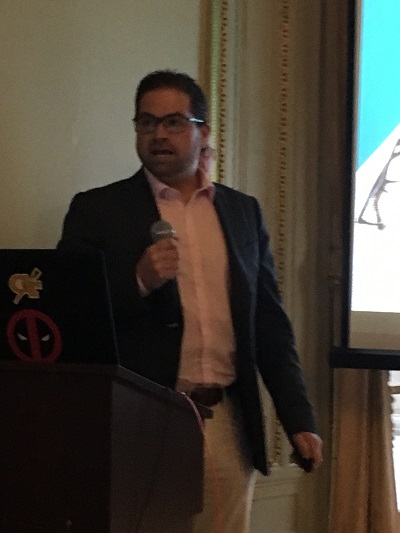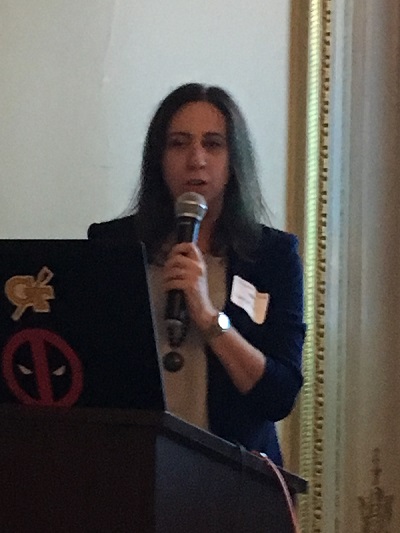Health IT Startups Pitch at NJII’s 2019 Healthcare Tech Summit at Morris Tech Meetup
A tech startup promising to cure one of the biggest headaches that medical practices face today was among the several young companies pitching at the 2019 Healthcare Tech Summit, held on June 11 at Fairleigh Dickinson University in Madison.
The summit, which also featured a panel discussion on healthtech innovation, was organized by the Morris Tech Meetup and the New Jersey Innovation Institute accelerator program called “Health IT Connections.”
The presentations included:
Navimize: New York-based Navimize offers software created to reduce patient frustration and attrition due to longer-than-expected wait times at doctors’ offices, increase the productivity and profitability of doctors’ practices, and improve patient online reviews.
Some of the panel members voted for Navimize, founded by internist Jennifer Meller, as having the best idea among the startups because of the product’s simplicity and benefits for both patients and physicians. According to Meller, the company is currently in a round of fundraising and has set a revenue goal of $40 million in five years.
Full Recovery Wellness Center: Full Recovery Wellness Center (Fairfield), an addiction treatment facility, has developed an app, called the “Freedom 365 Virtual Recovery System,” that is designed to help recovering addicts achieve long-term sobriety.
According to Rory McAlister, the company’s chief marketing officer and son of founder and addiction recovery expert Brian McAlister, one in five people in the U.S. suffers from some degree of addiction, but only a small percentage of them seek treatment. Rory said that the cost of the app is a fraction of the costs of traditional addiction treatment programs, which can run up to around $50,000 and tend to be very time-consuming.

BloqCube: BloqCube (Piscataway) provides blockchain technologies designed to streamline lengthy clinical drug trials by improving data accuracy, integrity and security. The product is primarily aimed at pharmaceutical and biotech firms.
Rama Rao, CEO and cofounder, said that its blockchain-driven management platform has the potential to save companies millions of dollars in terms of time spent on the process of monitoring clinical drug trials and verifying data. The company also recently announced a partnership with NTT DATA, a Tokyo-based systems integration company that will help BloqCube’s blockchain technology improve patient outcomes.
Medicine Differentiation Analytics: Medicine Differentiation Analytics (Mendham) has developed an analytical software and database management tool, called “MedifVu,” that allows greater differentiation and evaluation of products from the bio/pharmaceutical industries. With better data, bio/pharma companies can create more effective medicines and improve their bottom line. Managed healthcare organizations are also said to benefit from this product because it gives them a more efficient way to evaluate potential medicines for pricing purposes.
Eileen Morrissey, cofounder and CEO, said the product can provide valuable data that can also help eliminate the growing number of people experiencing adverse drug reactions in this country. How bad is it? According to a study done this year by Public Citizen’s Health Research Group, 2 million people in the U.S. have had adverse reactions to drugs, with more than 100,000 resulting in fatalities.
medEchat: medEchat (Morristown) claims it has found the solution to the problem of inappropriate communications between healthcare providers and their patients. Today, many patients and their healthcare providers are communicating with each other via texting, which violates HIPAA regulations; or there is simply a lack of communication, as patients are known to rarely use online portals provided by their caregivers.
Catherine Mazzola, a pediatric neurosurgeon and company cofounder, and Ryan Kennedy, cofounder and CTO, told the audience that their messaging platform allows healthcare providers to communicate with their patients, and with each other, in a secure environment that adheres to HIPAA compliance rules. One major benefit is the reduction in patient office visits, as healthcare providers can quickly scan or listen to information to decide if patients need to come to the office. The platform also provides educational materials to patients.
The startup has so far raised $200,000, and is seeking to raise $1 million in its next funding round.
Actual HealthCare Solutions: Actual HealthCare Solutions (East Windsor) says that it offers a new and more efficient way of allowing physicians to examine patients’ X-rays and other forms of medical imaging. The startup has introduced a cloud-based digital imaging software that is designed to improve patient care and reduce costs.
Currently, medical imaging data is stored in old CD-ROM technology, which can’t transfer images quickly; and it isn’t as reliable as the AHS cloud-based product, the company says. In addition, the proliferation of CD-ROMs poses an environmental threat, with an estimated 1 billion of plastic disks used for radiological purposes headed into landfills. Or, let’s put it another way: “We can build a bridge from Morristown to London, England, with the number of CD-ROMS available today,” said Jim Schulz, a senior adviser to the firm.
The startup has raised $500,000, is now in the process of raising a further $100,000, and will be seeking another $10 million in capital.
Portable EMR Solutions: Portable EMR Solutions (East Brunswick) has developed a smart-card technology that allows patients and their healthcare providers to quickly gain access to medical records stored in a cloud-based electronic medical records database, as well as on the smart card.
The smart card, which uses biometric identification technology, helps avoid the problem of patients providing erroneous or incomplete medical information to healthcare providers, which the company says can lead to incorrect diagnoses that could potentially harm patients.
The firm is looking to raise $500,000.




